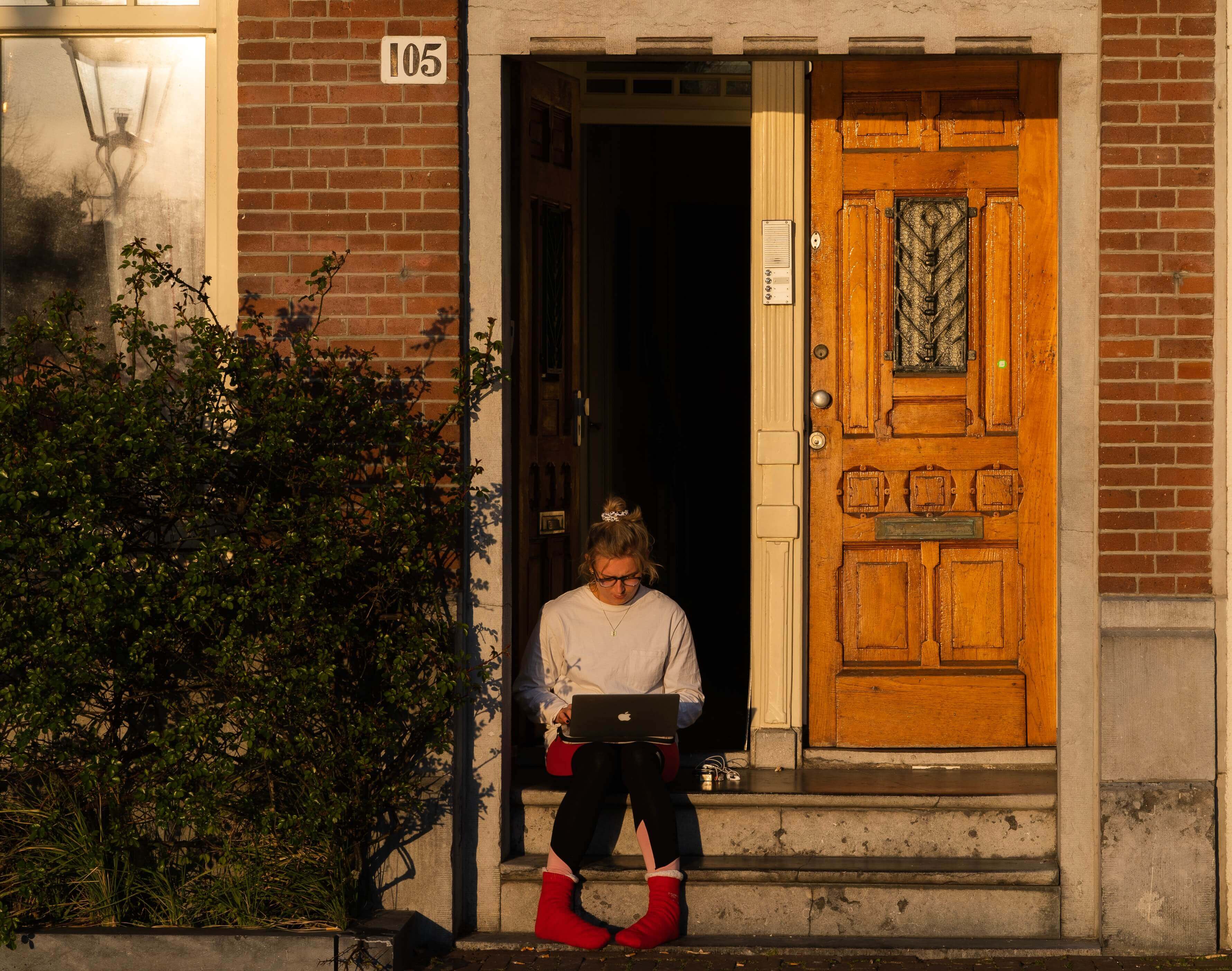
Inhaltsverzeichnis
Home Office: Tips for working from home
Although some businesses have reopened since last week, the current situation remains largely unchanged for many of us. The coronavirus pandemic is omnipresent, and the quarantine is slowly taking its toll on our nerves. While the time at home initially felt like a vacation, it is now becoming more stressful and energy-sapping by the day. This naturally also affects our motivation and thus the effectiveness of our work from home.
I've been working from home for over a year now (and from my favorite cafes—but that's not possible right now), so I've already addressed this topic several times. Today, I'd like to share with you the tips and tricks that consistently help me stay motivated while working from home. Hopefully, some of these suggestions will help you!
Home Office Tips for productive work from home
1. Get enough sleep & limited mobile phone time in the morning
Productive work starts with our sleep. If we can't sleep long enough or restfully enough, it can affect our energy levels. Then we can quickly find ourselves hitting "snooze" repeatedly, rolling over, or pulling out our phone to "wake up." There may be some truth to this excuse (I'm guilty of it myself, by the way) in that the bright light of our screens and the constant barrage of notifications do help us wake up. But it's certainly not sensible.
That's why I've gotten into the habit of turning on airplane mode in the evening and only turning it off after my morning ritual (see tip number 2). Alternatively, you can set your phone's settings to specify when you're "allowed" to use certain apps. For example, I've also set YouTube and Instagram to be "blocked" for me before 9 a.m. It would be even better, of course, to leave your phone in another room overnight and use a standard alarm clock.
2. Your own little morning ritual
Taking a little time for yourself in the morning can have an incredibly motivating and energizing effect. It might be 5, 10, or 30 minutes—whatever works for you. Whether you take your time to make yourself a coffee, go for a short morning walk, prepare a delicious breakfast, read a chapter in a book, take your dog for some fresh air, write in your journal, meditate, exercise...—it's up to you, of course. It's best to choose two or three activities that you can manage in terms of time and that aren't too demanding. It's also important that you enjoy these activities and don't do them because you feel like you "have to."
My morning ritual includes letting fresh air into my bedroom, making my bed, drinking a large glass of water, and then meditating for about ten to fifteen minutes.
Knowing how tomorrow's start will look before I go to bed makes me feel good, and I look forward to this time for myself and the day that follows. It took a bit of experimenting until I found the routine that feels best for me. But since I've been allowing myself that half hour in the morning, I feel much more motivated and balanced!
3. Get ready!
Of course, I mean that in the sense of “getting ready”.In my mind, it makes a big difference whether I sit at my desk in pajamas or sloppy clothes or whether I put on a "proper" outfit. Since I spend most of the day sitting down, the outfit still has to be comfortable (the paigh pants are great, for example), but it shouldn't be one of my "I'm chilling on the couch in sweatpants" combinations. If you like wearing makeup, that can also help you feel "ready" for work. Just like you would if you weren't working from home.

Photo by Charles Deluvio on Unsplash
4. The workplace
A suitable workspace can make a huge difference. Unfortunately, this can also be one of the most difficult things to implement. Not everyone has the space for a dedicated office or a quiet working environment. However, working from home can be made more pleasant with a few tricks.
- The most important rule is to get a fixed Create a workspace. Ideally, this should be far away from the bed or couch. A physical separation between sleeping/relaxing/working helps our brain internalize a mental separation of these activities.
- If you can position your desk so it's away from piles of clothes, dirty dishes, or other clutter, this will also contribute to your productivity. Surrounded by chaos and clutter, we can't concentrate as well on one task at a time and, for example, we might already be mentally planning when the next load of laundry needs to be done. Personally, I prefer having my desk by my window, as this also allows me to catch some sunlight.
- It's also important to keep your workspace as clean as possible. Regularly put away papers, pens, and folders you don't need. Even if you set up your workspace in a space that's usually used for something else (dining table, nightstand, coffee table), it's a good idea to clear that space as much as possible so you can concentrate fully on your work.
- Not only should your desk be tidy, but your desktop too. After all, it's part of your workspace. My brain feels more relaxed and empty when I have as few windows and tabs open as possible, and when I've reduced the number of icons on my desktop and arranged them neatly. It sounds unnecessarily fussy, but it makes a difference!
5. The power of lists
Anyone who knows me knows that I'm a big fan of to-do lists. They also help clear my head, and you get a little dopamine hit every time you check something off.
It helps to prioritize the items on your list. It's best to first write down everything that comes to mind. Then you can mark the two or three most important items on your list.
It is also good if you have complex list items (z.B. “Complete project”) into many small steps (z.B. “Research”/“make bullet points”/“x write an email”/“convert bullet points into text”/“finalize text”/“select images”/“create a presentation”/“create PDF” …).This gives you the opportunity to tick off several things throughout the day and visualizes what you have accomplished at the end of the day.
Photo by Charles Deluvio on Unsplash
6. Minimize distractions
Distractions from children, your partner, or other roommates aren't always avoidable. However, you can minimize potential other distractions. This can be done by turning off notifications (not just on your phone, but also email notifications on your laptop, for example), putting your phone as far away as possible, or setting yourself rules. For example, one of my rules is: "No checking WhatsApp messages at your desk." This creates a mental association that your desk (= work) and WhatsApp (= pleasure) don't belong together. If this rule isn't feasible for you because you have to communicate with colleagues, etc., via WhatsApp, then perhaps you can find another rule that serves the same purpose.
7. Breaks are just as important as work phases
Taking breaks is arguably one of the most important things of all. Our brains can't work at peak concentration for three hours straight, and we shouldn't expect them to. So, regularly take time for short breaks during which you consciously DO NOT engage with work-related content. A restful effect can only occur if our minds can truly switch off. For example, you can allow yourself to check your social media during breaks, watch an entertaining video, have a snack, or take a walk around the block.
Physical activity helps me especially during the well-known afternoon motivation slump. After lunch, I tend to slump on the couch with my smartphone in my hand, and my planned half-hour break quickly turns into a full hour. Therefore, when I notice the afternoon slump coming on, I try to do something physical. This way, I can transform the slump into a productive break. For example, I tidy up, vacuum, wash the dishes, or take a short walk. I also regularly manage to overcome the motivation slump with the help of stretching exercises or a little dance routine to my favorite song.
8. Make plans
In times when we're at home a lot and days are rather monotonous, it's important to consciously make time for enjoyable things. Even if we can't do as much as usual due to the current situation, there are still some things that can give us a pleasant end to the day. For example, you can arrange FaceTime dates with friends, pursue your favorite hobby, take time to read a book, cook something delicious, or spend time with your loved ones (if they live in your household). 😅). That way you have something to look forward to.
You can also set a time to stop working. This works for me sometimes better and sometimes worse, but it helps me mentally draw a line in the sand and end the workday.
Last but not least, I want to emphasize that it's important not to be too hard on yourself. There will always be days when things go better than others. And since the current situation is already stressful enough, it's totally understandable if you're having trouble staying motivated right now. You're not alone.All we can do is try to do our best and trust and hope that better times will come again.
Take care! ❤️
If you would like to learn more about mindfulness, healthy eating or sustainability, take a look here over.
Photo by Fa Barboza on Unsplash





























Leave a comment
This site is protected by hCaptcha and the hCaptcha Privacy Policy and Terms of Service apply.